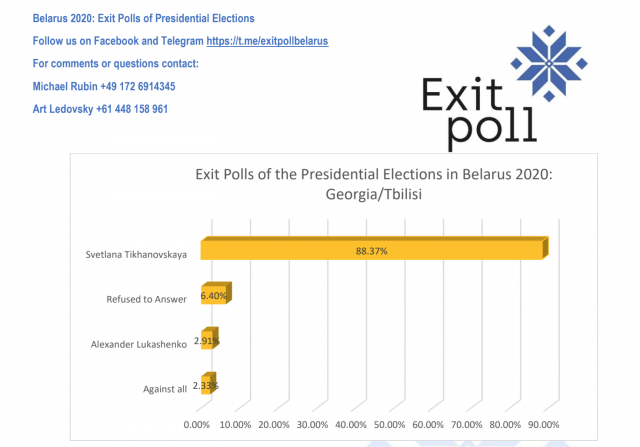Belarus Presidential Election: Exit Poll Results in Georgia
Below are the results of the exit polls conducted at the polling stations located outside of the Republic of Belarus for the presidential election 2020:
- 86.88% for Sviatlana Tsikhanouskaya
- 3.90% of votes went to her opponent and the current president Alexander Lukashenko
- The third most popular option is “Against All” with 1.46% of the votes.
Based on the results of the exit polls in Georgia, 88.3% of votes are for Sviatlana Tsikhanouskaya, 2.91% of votes are for Alexander Lukashenko, against all 2.33%.
The Exit Poll Abroad is an independent initiative that united Belarusians living in 25 countries, including Georgia.
The Belarusian Embassy in Georgia announced fair results for the elections.
The purpose of the Exit Poll Abroad project is to ensure the transparency and fairness of the Belarusian elections in 2020.
Sadly, projects like this one are outlawed in Belarus because of the legislative restrictions imposed on the political and social polls. Independent electoral sociology is impossible in Belarus these days.
For the first time in the 29-year history of independent Belarus, neither the OSCE/ODIHR election observation mission nor observers from the Russian Federation were monitoring the elections.
The election committees were made “sterile” this year, as no independent members or representatives of the candidates were allowed. Thousands of independent local observers were denied access to polling stations, and dozens of them were detained by the police.
The Exit Poll Abroad is a unique project which reveals the results of the Belarus Elections transparently and communicates these results to the world.
Presidential elections were held in Belarus on Sunday, 9 August. Early voting began on 4 August and ran until 8 August.
The President was elected directly to serve for five years. Incumbent Alexander Lukashenko was re-elected to run for a sixth term in office (closing polls totaling about 80% of all votes in his favor), having won every presidential election since 1994, with all but the first being labeled as neither free nor fair.
The prior election was reported as not being democratic to this same effect.
By Ana Dumbadze












